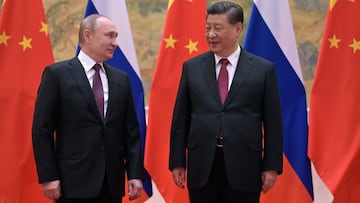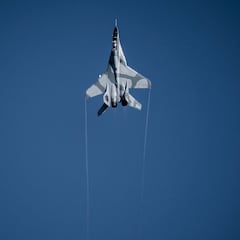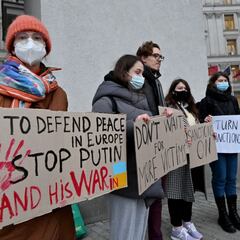Is China supporting Russia? What is the relationship between China and Russia?
The geopolitics that have come into play since Russia invaded Ukraine are finely balanced, and as NATO decides its next move, another superpower watches on.

As nations around the world pick a side, choose their response, and prepare for what is an uncertain future, the Chinese government, which struck a "no limits" partnership accord with Russia just weeks before Moscow's 24 February invasion of Ukraine, has blamed NATO expansion for the crisis and urged talks to resolve the situation.
On social media, the Chinese public has shown overwhelming support for Russia's attack, which Moscow calls a "special operation".
More on Russia-Ukraine conflict:
- Anonymous hack Russian TV
- Where are Europe's nuclear power plants?
- Zaporizhzhia nuclear power plant stable after Russian attack
- Chernobyl, the worst manmade disaster
- What is a no-fly zone?
China's contrasting stance to the West
Chinese firms are staying put in Russia for the moment despite a growing exodus of Western companies - albeit bracing for growing uncertainty - taking a cue from Beijing's stance of refraining from criticizing Moscow over its invasion of Ukraine.
Even as Apple, Nike, Netflix, fashion chain H&M and many other Western companies have cut or paused business in Russia amid a tide of sanctions and international criticism of President Vladimir Putin's actions, Chinese firms so far have stayed largely silent about their operations in Russia.
Chinese ride-hailing giant Didi Chuxing faced a public backlash in China last week after it announced it would pull out of Russia, with social media users accusing it of succumbing to U.S. pressure on Moscow. It later reversed the decision without giving an explanation.
IPC President Andrew Parsons appeared to Chinese viewers and listeners to have a mic issue at the Paralympic Opening Ceremony this evening. But in fact his speech about how he was "horrified at what is taking place in the world right now" was censored in China. pic.twitter.com/AAVYNard6Z
— Mark Dreyer (@DreyerChina) March 4, 2022
Lenovo, the world's No. 1 personal computer maker, was also subject to heavy criticism in China when a local Belarusian news outlet reported, without saying where it got the information, that it would cease supplying Russia. Lenovo did not respond to Reuters' requests for comment on the issue.
The relatively small size of the Russian market for Chinese firms would however make it easier for them to change tack and join foreign rivals in departing, especially as Moscow faces economic collapse due to growing Western sanctions.
"For most Chinese companies, Russia is just too small of a market for the business to be worth the risk of getting cut off from developed markets or being sanctioned itself," wrote Dan Wang, an analyst for Gavenkal Dragonomics, in a research note.
Russia's smartphone market, for example, totalled 31 million units last year, or just one-tenth of China's domestic market size by comparison, according to research firm IDC.
By opting to stay in Russia, Chinese companies may be in a position to grab market share. But how long more they will be able to sell there for is a big question, given escalating sanctions and export curbs, analysts said.
In the realm of smartphones, Chinese brands such as Xiaomi and Honor vie with market leader Samsung and Apple for sales in Russia, while Chinese automakers such as Great Wall Motor and BYD have also targeted the Russian market in recent years. These Chinese smartphone makers use chips designed at least partially with U.S.-origin technology.
This potentially subjects them to secondary sanctions against Russia via the Foreign Direct Product Rule, which stipulates that products with a certain percentage of U.S.-origin technology cannot be shipped to targeted parties without a proper license.
Huawei Technologies and Semiconductor Manufacturing International Corp (SMIC), two companies that produce critical technologies such as chips and networking gear, are themselves subject to U.S. restrictions, and also rely on overseas technologies to produce final goods.
"Chinese companies will have to make intuitive and technical judgments on the likelihood that the products they’re manufacturing and their related inputs and plants are captured by these complex regulations," said Nathan Bush, who practices trade and antitrust law at DLA Piper in Singapore.
He said Chinese firms are likely pausing to assess their supply chain's vulnerability given the "devilishly complicated" nature of the foreign direct product rules.
Xiaomi and Honor did not respond to requests for comment. Huawei, SMIC, Great Wall and BYD declined to comment.
At least for now, it appears that China Inc is trying to conduct business as usual in Russia and is ready to bite the bullet.
On March 2, the day Apple announced it would pull out of Russia and the rouble tumbled against the U.S. dollar, a commentator asked the Instagram account of Xiaomi Russia whether they planned to raise prices.
"Prices on our official website have not changed," Xiaomi Russia replied.
Premier League Ukraine tributes blacked out
Chinese rights holders have told the Premier League they will not broadcast matches this weekend over the league's planned show of support for Ukraine following Russia's invasion, the BBC reported on Friday.
The Premier League said on Wednesday teams will show their support for Ukraine at games from March 5-7, with all 20 captains wearing special armbands in Ukrainian colours.
The league said fans are encouraged to join players, managers, match officials and club staff in a moment of reflection and solidarity before kick-off at each game.
The screens at stadiums will display "Football Stands Together" against the backdrop of the blue and yellow colours of the Ukrainian flag.
Statement by the North Atlantic Council on Russia's attack on Ukraine#NATO | #Ukraine 🇺🇦 | #StopRussianAggression
— NATO (@NATO) February 24, 2022
At the time of writing the Premier League had not yet commented on the situation.
Asia on Russia's doorstep
Before the dissolution of the Soviet Union, both Russia and Ukraine were part of it. They are the two largest countries in Europe and share a mutual land border stretching 1,300 miles.
From the 16 nations that border Russia and Ukraine, some are NATO alliance members in Europe, while Asia to the east also sits in close proximity.
China, although a communist country, had until recently been an adversary of Russia. However over the years China’s President Xi Jinping and Putin have developed a strong friendship. The two met weeks before Russia invaded Ukraine and Russia moved a large portion of its forces from the east to take part in the invasion.
Russia’s longest land border is with Kazakhstan, also a former Soviet republic. It recently asked Putin for help with an uprising that nearly toppled the government. Protests started after the government removed its price cap on liquefied petroleum gas which many Kazakhs use to power their cars.
Related stories
Mongolia, which is squeeze between the two giants, has had strong ties with Russia since Soviet times. And in the far east Russia has a small border with North Korea. The isolated nation has relied on help from Russia in international negotiations and in times of crisis.
It's also worth noting that Russia shares maritime borders with the US off the coast of Alaska between the Diomede Islands in the Bering Strait and with Japan.

